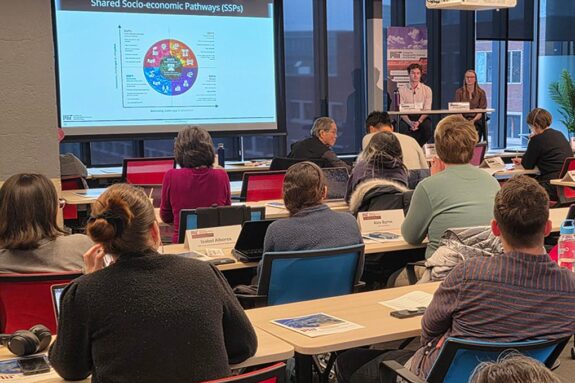Sai Ravela earns J-WAFS grant for solutions-oriented sustainability project in India

Yanchong (Karen) Zheng (left), an associate professor in the MIT Sloan School of Management, and Sai Ravela, a principal research scientist in the department of Earth, Atmospheric, and Planetary Sciences, have been named grantees of the 2024 J-WAFS Grant for Water and Food Projects in India.
J-WAFS is excited to announce the grantees of the 2024 J-WAFS Grant for Water and Food Projects in India. The grants are intended to further work being pursued by individuals as a part of their MIT research, innovation and entrepreneurship, coursework, or related activities. The expectation is that projects will benefit low-income populations by involving on-the-ground work with local communities in India. The funding opportunity is open to members of the MIT community in all departments and programs. This year’s projects, led by PIs from the Sloan School of Management and the Department of Earth, Atmospheric, and Planetary Sciences, aim to explore strategies to enable and support sustainable agricultural practices on farms across the country.
Affordable, accurate, detailed climate projections for climate-resilient agriculture in India
Project team: Sai Ravela, PhD, principal research scientist, MIT Department of Earth, Atmospheric, and Planetary Sciences; Subimal Ghosh, institute chair professor, Indian Institute of Technology, Bombay Department of Civil Engineering and the Department of Climate Studies; Anamitra Saha, postdoctoral associate, MIT Department of Earth, Atmospheric, and Planetary Sciences
Sai Ravela, PhD, a principal research scientist in MIT’s Department of Earth, Atmospheric, and Planetary Sciences (EAPS), is leading this 2024 India Grant project. The project aims to develop climate projections for climate-resilient agriculture in India. Ravela and the other members of the project team aim to develop a climate-aware decision support system that agricultural policy planners can use for decision-making in water management, irrigation planning, supply chain stabilization, and crop variety selection in India.
For context, India’s economic productivity relies heavily on agriculture, which is threatened by climate change and the water crisis. To meet the growing demands, the country has implemented several agricultural policies with short-term benefits at the cost of long-term environmental sustainability. Rising temperatures, erratic monsoons, and increasing droughts are now putting the food and water security of the country, as well as farmer livelihoods, at risk.
As a result, the researchers hope to determine whether incorporating long-range climate projections could improve sustainable agricultural decision-making in the country. The project has two major components. First, the team plans to develop a computational method that transforms coarse resolution climate simulations into detailed predictions for local decision-making. Second, the team will build an AI-based optimization framework that handles multiple competing objectives, such as increasing resilience against climate-related risks, minimizing water and energy usage, and maximizing crop yield, to enable sound practices and policies.
This project builds on Ravela’s body of work, which centers around risk assessment of extremes in a changing climate. Specifically, he has worked to quantify cyclone-induced risk and is developing soil observatory and sustainable livelihood solutions in Southwest Bangladesh. The other project team members, Professor Subimal Ghosh and Anamitra Saha, PhD, have also collaborated on related projects. During Saha’s graduate studies, he worked with Ghosh to examine the impact of anthropogenic emissions on the Indian monsoon and investigate the relative contributions of climate and land use changes to the hydrology of major river basins in India. As a postdoctoral associate, he advanced downscaling methods under Ravela’s supervision.
Incentive design to promote long-term adoption of sustainable practices by smallholder farmers in India
Project lead: Yanchong (Karen) Zheng, associate professor, MIT Sloan School of Management
Yanchong (Karen) Zheng, the George M. Bunker Professor and an associate professor of operations management at the MIT Sloan School of Management, is the lead of this project that aims to develop innovative incentive mechanisms for widespread, permanent adoption of sustainable practices by smallholder farmers.
The project fits within Zheng’s broader research interest, which focuses on the design of incentives, technologies, and behavioral interventions to enhance efficiency, welfare, and sustainability in food and agriculture systems. She also led a 2021 J-WAFS seed grant project with a related focus around developing analytics and optimization tools to inform the quality investment and market selection decisions of smallholder farmers. In that work, Zheng collaborated with a local nonprofit to test the analytical tools across fresh produce farmers in Bihar, India.
Zheng’s 2024 India Grant project will examine the effectiveness of two different incentives: a fixed reward prevalent in payments for ecosystem service programs and carbon offsetting projects; and a supply-dependent mechanism where sustainable farmers receive a premium per unit supply plus a fixed bonus. The project team will examine the efficacy of these incentives in randomized controlled field trials with smallholder farmers in India.
Over the course of the year-long grant period, Zheng will conduct a scoping study that will focus on identifying a specific sustainable practice and geographical region as well as building the necessary groundwork for the field trials. Specifically, Zheng will engage in discussions with various stakeholders including officials, private-sector players, and local communities to select the target region and practice. A simulation experiment will be designed and conducted with representative samples of farmers in the target region to obtain proof of concept regarding the efficacy of the different incentives. Results from the experiment will also inform how the incentives may be adapted to suit local conditions to further enhance efficacy. The overarching goal of this preliminary study is to create a fine-tuned design of the field trials to be pursued in the next phase of the project.


